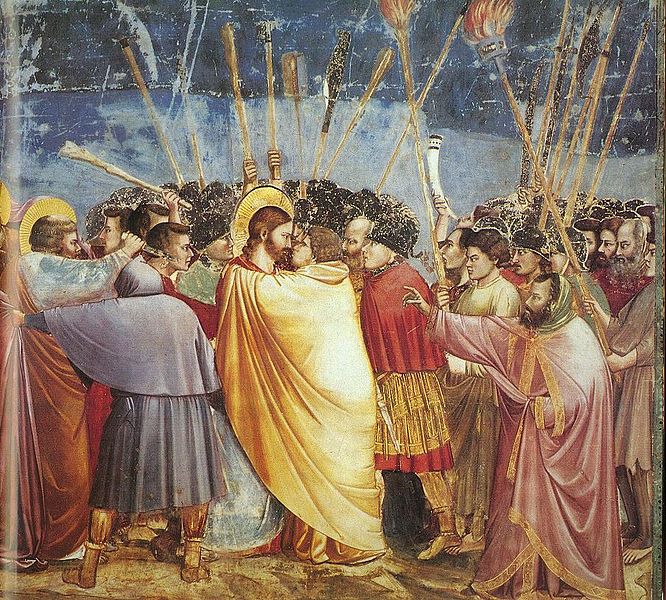16. Mark 14:43-46
Immediately, while he was still speaking, Judas, one of the twelve, arrived; and with him there was a crowd with swords and clubs, from the chief priests, the scribes, and the elders. Now the betrayer had given them a sign, saying, “The one I will kiss is the man; arrest him and lead him away under guard.” So when he came, he went up to him at once and said, “Rabbi!” and kissed him.
There are few scenes in the Passion that have become more famous; indeed, that have been lifted almost entirely from their original context. A “Judas kiss” has come to mean the worst kind of betrayal, not simply in that it is betrayal by one who is a close comrade, but that the act of betrayal itself is profession of intimacy. In this way, both the friendship and its sign are betrayed, inverted, destroyed.
There is certainly a heart-wrenching betrayal here. Indeed, both Matthew and Mark use a Greek word that describes not the peck on the cheek that children anticpate receiving from elderly aunt, but an intense, heartfelt, kiss of great warmth that was reserved in the ancient world for the greeting of great friends. Judas greets his teacher as a close friend, and in this way adds painful insult to mortal injury.
But that is just one detail on this night, and I want for a moment to draw our attention to the other elements of this confrontation. In addition to Jesus and Judas, the disciples – some or all – are present, several shame-faced for their failure to stay awake. But there are others, too, made up of those loyal to several of the groups that stand opposed to Jesus: the chief priest, scribes, elders. There is, as Mark reports, a crowd. And they’ve come armed with swords and clubs in the dead of night. All this to arrest one man.
It was a chaotic scene, where a normally quiet evening was shattered by the clatter of sword and club, the stomping of feat. There was the smell of sweat and fear. There was the flash of color and metal in the half light of torches slicing through the black of night. It’s easy to miss all this because we focus so quickly on the intimate betrayal. But there is a whole cosmos of activity going on around these two, something that I was reminded of by the following painting by 14th century Italian artist Giotto di Bondone.
Certainly there is a terrible intimacy to the now infamous betrayal, yet at the same time Giotto reminds us that all these others surround Jesus and are, indeed, caught up in events beyond their ken.
I think this is right, because what happens here is not meant to be private. What happens here is for the redemption of all, for the faithless disciples and dutiful and violent members of the mob, for the priests who accuse and betrayer who kisses, for all those who slumbered in their homes unaware of what transpired that night and all those who sleep today, unaware of this man or his sacrifice. Yes, there is a whole cosmos of activity around Jesus as he is betrayed, and he accepts his fate, seizes his destiny, climbs upon his bitter throne for all of them. For all of us.
Prayer: Dear God, remind us this day and always that your Son was beaten that we might be comforted, endured fear that we might live with courage, and died on the cross that we might live, now and forever. And remind us that he did all of this for all of us. In Jesus’ name, Amen.








Recent Comments